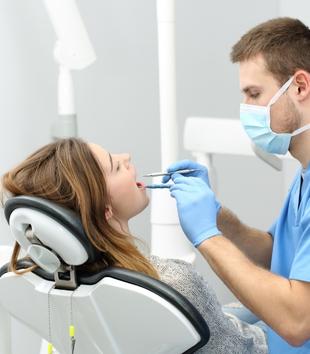Missing one tooth
Implant crown:
Benefits:
- Does not damage the adjacent teeth
- Allows flossing, all teeth independent
Risks:
- Possible bone loss around implant
- Slightly more expensive than a tooth supported bridge
Tooth supported bridge:
Benefits:
- Does not require surgery
- Potentially less expensive
Risks:
- Involves the adjacent teeth
- May damage the adjacent teeth
- Teeth joined together, difficult to floss
- More maintenance in the future if teeth have a problem
Missing multiple teeth
Implant supported bridge:
Benefits:
- no risk of cavities
- No damage to adjacent teeth
Risks: :
- Requires surgery
- Implants can fail in the future
Tooth supported bridge:
Benefits::
- Does not require surgery
- Potentially less expensive
Risks:
- Involves the adjacent teeth
- Can damage the adjacent teeth
- Retaining teeth can get gum disease or cavities causing loss of the bridge
- Teeth joined together
- More maintenance in the future, higher risk of failure
Removable partial denture:
Benefits:
- Least expensive option
- Easy to fix
- Easy to clean, (remove to clean)
Risks:
- Moves with chewing, can cause gum irritation
- Lots of metal in the mouth with metal clasps on the retaining teeth
- Least chewing power of all the options
Missing all your teeth
Dentures:
Benefits:
- Least expensive way to replace your missing teeth
- Easy to repair
Risks:
- 50-75% loss of chewing power
- Denture movement can cause tissue soreness
- Decrease in taste with palate coverage
- Requires relines every 2-5 years to refit as needed
Clip retained denture, two implants:
Benefits:
- Only need two implants
- Least expensive way to stabilize a lower denture
Risks:
- Still relies on gum tissue for support so can get sore spots
- Clips need replacing every 6-12 months
- Not generally recommended for the upper jaw
Clip retained denture, four or more implants:
Benefits:
- Implant supported to improve chewing power and decrease sore spots
- Flange to support lip contours for improved facial cosmetics
- Removable so is easy to clean
- Palate is open for improved taste and comfort
Risks:
- Requires 4-5 implants
- Clips need changing every 1-2 years
- Still slight movement of denture since it is removable
Implant supported fixed denture, acrylic and titanium
Benefits:
- Compatible material with upper denture
- No movement, greatest chewing power
- No gum tissue pressure
- Easy to repair
- Least expensive fixed bridge
Risks:
- More prone to fracture
- Requires 4-5 implants
Implant supported fixed denture, ceramic zirconia
Benefits:
- Hardest and most durable material
- Used when chewing against natural teeth or implants
Risks:
- More expensive
- Requires 4-6 implants
Implant supported fixed bridges, ceramic fused to metal or zirconia
Benefits:
- Hardest and most durable material
- Good for chewing against natural teeth or porcelain bridgework
- Least bulky type of restoration, mimics the size and shapes of natural teeth
Risks:
- Requires 6-8 implants
- Most expensive way to replace teeth (almost twice as expensive as acrylic)
- Prone to chipping and most difficult to repair
Who surgically places your implants?
Please remember, dental implants are medical devices surgically implanted in your body. Just like you want a quality hip surgeon placing your new hip, your dental surgeon should be well versed in the surgical phase of dental implants. The first effort at implant placement is your best chance of a quality outcome. If the first implant fails, a second implant surgery is more difficult and less predictable. Dental implants are also not created equal. Some implants are of higher quality (more precisely machined and manufactured) than others. Make sure your surgeon is using a quality implant system. Ask questions! Make sure your surgeon is well qualified before you start treatment.
General Dentist: education consists of dental school followed by continuing education courses and experience. Often well qualified to place implants in straight forward situations and place straight forward bone grafts.
Periodontist: Specialty education of 2-3 years after dental school learning surgery of the gum and bone tissue surrounding the teeth. Capable of removing teeth, grafting bone to improve implant sites and educated in placing implants in multiple situations from easy to complex.
Oral Surgeon: Specialty education of 4-6 years after dental school learning complex surgeries of the jaws. This includes jaw repositioning surgery, trauma surgery reconstruction and easy to complex bone grafting procedures. They are also capable of placing implants in all situations from simple to complex.
Implantologist: There is no such thing as an implantologist or “implant specialist”. Some dentists advertise as such but the American Dental Association does not recognize it as a specialty so be wary of anyone who claims to be an “implant specialist”.
Who Restores your implants (makes your teeth)?
Denturist: A dental laboratory technician, they are not dentists. They generally have a community college education in denture fabrication and denturism (making dentures directly to the public without a dentist being involved). They can make complete and partial dentures and basic implant retained overdentures
General Dentist: dental education then continuing education to learn more involved implant treatment. Depending on the continuing education (evening course, weekend course, full year involved educational program) general dentists can restore most implant needs.
Prosthodontist: 3-4 years of specialty training beyond dental school. They are the specialist trained in replacing and rebuilding teeth including teeth and jaw structures lost to cancer, trauma or dental disease. Able to help the surgeon plan ideal implant placement for dental implant reconstructions. Capable of restoring simple to complex implant reconstructions and highly trained in extensive full jaw and full mouth implant reconstructions.

 (425) 549-4649
(425) 549-4649







